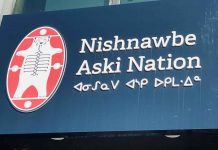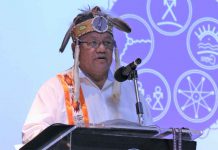
Ontario First Nations Notice of Assertion Announced
TORONTO – ANISHINABEK – Ontario Regional Chief Stan Beardy gave formal notice to Canada, the province, resource developers and the general public through a Notice of Assertion that First Nations inherent and Treaty rights will continue to be asserted in original territories and ancestral homelands in Ontario.
The Notice of Assertions was announced this afternoon.
The Notice of Assertions was adopted by the Chiefs-in-Assembly, comprised of leadership from First Nations throughout Ontario, by Resolution on June 11, 2014.
These rights include, but are not limited to, those re-affirmed by Section 35 of the Constitution of Canada and the United Nations Declaration on the Rights of Indigenous Peoples.
“The purpose of the Notice is to assert that these Treaties still govern the relationship between the Crown and First Nations,” stated Ontario Regional Chief Beardy. “This Notice does not lay out an exhaustive list of rights; rather, it sets forward several principles and understandings related to lands and resources. It is based upon the Treaties and Covenant Chains established with the Crown which were made between sovereign independent nations.”

Nishnawbe Aski Nation (NAN) Grand Chief Harvey Yesno reaffirmed NAN First Nations’ determination to defend our lands following a Notice of Assertions of First Nations Inherent and Treaty Rights announced by First Nations leaders at Queen’s Park today.
“Proposed resource development is putting tremendous pressure on our lands and First Nations are facing unprecedented challenges and threats to our inherent and Treaty rights,” said Grand Chief Harvey Yesno. “Many communities are struggling to address basic issues such as access to health care, housing, education and economic development. NAN Chiefs have made it clear that we, the people of the land, will defend our right to control development in our territories so that the wealth from our lands continues to benefit and sustain our people and our Nation.”
FIRST NATIONS IN ONTARIO ASSERTION OF SOVEREIGNTY NOTICE OF ASSERTIONS
Purpose
By this Notice of Assertions, the First Nations whose territories and lands are within the boundaries of the Province of Ontario (hereafter: First Nations), give formal notice to the Province of Ontario and Canada, to other governments, to resource users and developers, to neighbours and the general public that First Nations inherent and Treaty rights are currently and will continue to be asserted over traditional and historical territory, and ancestral lands. These rights include, but are not limited to, those re- affirmed by Section 35 of the Constitution of Canada and the United Nations Declaration on the Rights of Indigenous Peoples.
This Notice has been adopted by the Chiefs-in-Assembly, comprised of leadership from First Nations throughout Ontario, by Resolution on the date of June 11, 2014.
This First Nations assertion is based upon the Treaties and Covenant Chains established with the Crown. These Treaties were made between sovereign, independent Nations who, based on mutual recognition of obligations, reached agreements.
Like the Constitution of Canada, the Treaties are living and continue to inform our ongoing relationship with other governments. The Treaties impart benefit upon each party, who must also accept the obligations attached to these benefits.
The purpose of the Notice is to assert that these Treaties still govern the relationship between the Crown and First Nations. This Notice does not lay out an exhaustive list of rights; rather, it sets forward several principles and understandings related to lands and resources. This Notice is without prejudice to the rights, titles or claims of any individual First Nation.
Self-Determination
As has been asserted by First Nations and re-affirmed by Canada through ratification of the United Nations Declaration on the Rights of Indigenous Peoples, all First Nations have the right to self-determination. Consistent with the right to self-determination, First Nations have the right to assert jurisdiction over lands and resources and, consistent with these jurisdictions, govern their lands and resources in accordance to traditional and inherent laws.
Territory and Ancestral Lands
Treaties recognize that the lands of Turtle Island have historically been and are currently held by First Nations. First Nations have never ceded title to these lands, as was the understanding of the leaders of the sovereign First Nations who entered the
Treaties. First Nations continue to hold and to assert rights and interests in their original territories and ancestral lands just as prior to any Treaty with the Crown.
Resources
First Nations maintain rights to resources within traditional territories.
These resources include, but are not limited to: fish, trees, wildlife, mines, minerals, waters, biological resources, medicines and plants.
First Nations have the right to access, manage and develop these resources.
First Nations have the right to derive benefit from these resources. First Nations have the right to determine third party use of these resources and the conditions under which third parties may access or use these resources. First Nations have the right to grant or withhold free, prior and informed consent on any activity that may affect First Nations resources or their rights or title related to these resources. First Nations may determine management, use and access consistent with traditional laws and governance.
Relationships
First Nations seek to proceed on the basis of mutual respect and to seek mutual understanding. While unyielding in the assertion of rights, First Nations will seek to build consensus with one another on local matters related to the assertion of rights and claims, and will enter into good faith dialogue to inform non-First Nations parties of their duties and obligations as per the Treaties.
—
This is a short list that establishes the basis for parties to engage with First Nations based on First Nations inherent and Treaty rights and jurisdictions. All those seeking to access or use First Nations lands or resources have, at a minimum, a duty to enquire, engage and consult in a manner consistent with the standard of free, prior and informed consent.
First Nations will take appropriate steps to enforce these assertions.






